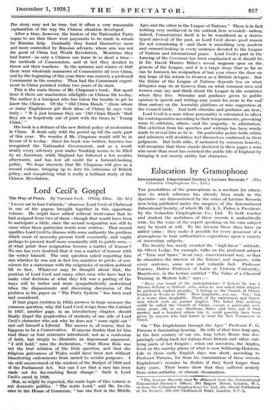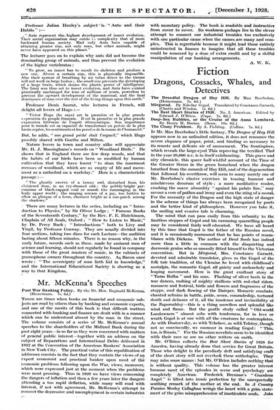Education by Gramophone
International Educational Society's Lecture Records.* (The Columbia Graphophone Co., Ltd.)
THE possibilities of the gramophone as a medium for educa- tion—to which reference has already been made in the Spectator—are demonstrated by the series of Lecture Records now being published under the auspices of the International Educational Society, of which Mr. H. A. L. Fisher is President.
by the Columbia Graphophone Co., Ltd. To both teacher and student the usefulness of these records is undoubtedly wide, for the voice of the expert speaking on his own subject may be heard at will. To the layman these discs hive an
added value : they make it possible for every possessor of a gramophone to hear authoritative expositions upon a variety
of interesting subjects.
The Society has wisely avoided the " high-brow " attitude, Sir Oliver Lodge, for example, talks on the profound subject of " Time and Space " in an easy, conversational way, so that
he stimulate's the interest of the listener and imparts, with every sentence, some new and valuable fact. Professor Conway, Ilulme Professor of Latin at Victoria University;
Manchester, in the lecture entitled " The Value of a Classical Training in Modern Life," says :—
" Have you heard of the undergraduate—I believe he was a Rhodes Scholar at Oxford—who, when ho was asked what religion he professed, replied proudly, ' I belong to the Church of Christ/ founded in Texas in 1868.' How laughable, you say. Yes ; but it is worse than laughable. Think of the narrowness and bitter. ness which such an answer implies. The belief that nothing could be called the Church of Christ, except a particular sect, sixty years old, in one American "State, and then ask if that answer, and a hundred others like it, could possibly have been given by anyone who had learnt to read the New Testament in Greek."
On " The Englishman through the Ages " Professor F. G. Parsons is fascinating hearing. He tells of that time long ago; in the first century of our era, long before Rome was des- pairingly calling back her legions from Britain and other out- lying parts of her Empire ; when our ancestors, the Angles; lived on the marshy plains, of what is now Schleswig-Holstein. Life in those early _English days was short, according' to Professor Parsons, for from his examination of these remote Englishmen's remains he doubts if they lived longer than forty years. Their bones show that they suffered acutely from osteo-arthritis, or chronic rheumatism.
• The Lecture Records may be obtained from the International Educational Society's Offices, 189 Regent Street, London, W.1, or from the Columbia Graphophone Co. Ltd., the official Publishers of the Society, 102-108 Clerkenwell Road, London, E.C. 1.
- Professor Julian subject -'1s.-- `! Aida- and -their Habits " ." Ants represent the= highest. development- of insect eyolution. Their social organisation may outdo i complexity that of more backward human society. Had only Ants been capable of attaining greater size, not only man, but other animals, might never have appeared on this planet."
The lecturer goes on to explain why ants did not become the dominating group of animals, and thus prevent theevolutiOn of the higher vertebrates : - - " To grow, an insect has to moult its skeleton and produce a new one. Above a certain size, this is physically impossible. Also their system of breathing by air tubes direct to the tissues will not work in large bodies ; the small size prevents the flevelopitig of a large brain, which denies the plastic' power of - The limit was thus set to insect evolution, and Ants have existed practically unchanged for tens _of millions of years, powerless to prevent the upward development of the mammal, and the final deMiaance of man over the rest-of the living things upon this earth." . _
Professor Denis Seurat, who lectures in French, will delight all lovers of lingo :- "Victor Hugo. (he says) est la premiere et In plus grande expression du peuple francaia. 11 est la premiere et In plus grande expression litteraire. de I' esprit democratique. Son importance pour le -monde est sa capacite de transformer 'en poezie de la plus haute °space, les sentiments at les pensees de la masse de l'humanite."
But, he adds, " son grand *chi ituit rorgueil," which Hugo possibly shared with Goethe. and Milton.
Nature lovers in town and country alike will appreciate Mr. H. J. Massinghams's records on " Woodland Birds." He shows that in England there are few deep woods, and that the habits of our birds have been so modified by human cultivation that they have learnt " to shun the innermost
recesses of woodland, which are as empty of life and move- ment as a cathedral on a weekday." Here is a characteristic passage :- " The ghostly swerve of a tawny owl, disturbed from his cloistered doze, in an ivy-dressed oak ; the pebbly-bright' per- cussions of black-capped - coal or marsh tits rummaging in the leafy upper world ; the rasping scream of a jay, too furtive to allow us glimpse of a form, chestnut bright as a sun-patch among the shadows."
.• There are many lectures in the series, including an " Intro- duction to Physics," by Sir Oliver Lodge ; " Famous Books
of the Seventeenth Century," by the Rev. F. E. Hutchinson, Cllaplain Of All Souls, Oxford ; " How to Listen to Music,"
by Dr. Percy Buck ; " Introductions " both to Livy and Virgil, by Professor Conway. They are usually divided into four sections, taking two discs for each Lecture—the audition lasting about fifteen minutes. There is no reason why, in the early future, records such as these, made by eminent men of science and learning, should not regularly be found in company with those of the great masters of music, in the cabinets of gramophone owners throughout the country. As. Bacon once wrote : " The sovereignty of man lieth hid in knowledge," and the International Educational Society is showing us way to that Kingdom.









































 Previous page
Previous page